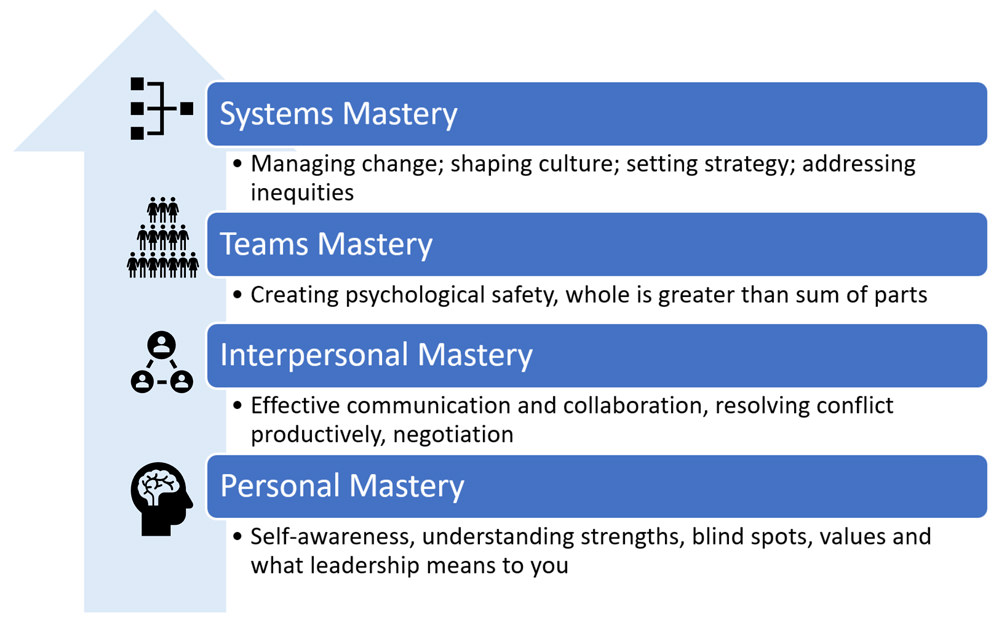Department chairs sit at one of the most complex intersections in higher education: leading peers while navigating faculty-administrator dynamics, overseeing core decisions, and setting the tone for department culture. Most enter these roles with little preparation, feeling overwhelmed and under-equipped.
Academic Impressions partners with institutions to transform department chair development from transactional onboarding to transformational leadership development. Whether new or seasoned, chairs leave our programs more confident, connected, and ready to lead with purpose.
What Makes Our
Approach Unique
1. Leadership, Not Just Logistics
We don’t treat chair development as an extension of faculty development. It’s leadership development—rooted in self-awareness, identity, and the real dynamics of leading others.
2. Flexible, Proven, and Practical
Our model draws on 20+ years of expertise, a proven four-level leadership framework, and practical tools chairs can use immediately. We meet institutions where they are—supporting new, seasoned, or mixed cohorts across formats.
3. Build Capacity, Not Dependency
From coaching to cohort-based programs, we help institutions embed chair development within their culture—training internal facilitators and providing tools that live on beyond our involvement.
Connect with a Chairs Leadership Expert
Get guidance as to how to set your department chairs and department heads up for success.
How We Help
Every institution has a different starting point—and so does every department chair. That’s why our approach is rooted in deep listening, customization, and a flexible curriculum built on real leadership development. We begin by understanding your context, then co-create a chair development experience that meets your people where they are.
We support institutions through engagements such as:
Standing Up a Chair Development Program from Scratch
We help you build your first structured leadership experience for department chairs. Whether it’s a 5-week cohort with group coaching or a year-long facilitated journey, we help you move beyond transactional handoffs to meaningful leadership preparation.
Creating Community and Shared Language Across Chairs
We help you foster campus-wide alignment through cohort-based learning that connects chairs across disciplines. Participants build a shared vocabulary for leadership, communication, and team dynamics—strengthening trust and reducing isolation.
Repairing Dysfunctional Team or Leadership Dynamics
When departments experience high conflict or low trust, chairs need tools to lead culture change. Our workshops and coaching focus on feedback, conflict resolution, and team psychological safety—helping chairs guide their units forward.
Building Internal Capacity to Sustain the Work
We help you embed leadership development into your institutional infrastructure—training internal facilitators, aligning with membership content, and designing onboarding experiences that last long after we leave.
Equipping Seasoned Chairs for Their Next Leadership Chapter
Veteran chairs face unique challenges. We offer advanced training to help them reset, grow into more strategic roles, and build resilience. Many institutions use our cohort program or individual coaching to support this stage.
Our Curriculum: Four Levels of Leadership Development
Our chair development curriculum is grounded in Academic Impressions’ proven leadership development model and can be fully customized to your institution’s needs. While all four levels are available, most department chairs and heads benefit by focusing on the first three, which directly address the day-to-day realities and long-term demands of the role.
What do you need to learn to be a leader?

Personal Mastery
Chairs must lead peers without the traditional authority of administrative roles. At this level, we help them:
- Explore their unique leadership identity and values
- Understand how their personal habits, mindsets, and biases shape the way they lead
- Build self-awareness and confidence to make difficult, value-aligned decisions
Interpersonal Mastery
As front-line academic leaders, chairs are constantly navigating relationships and conflict. This level equips them to:
- Have constructive, honest conversations with colleagues—even when stakes are high
- Give and receive both positive and constructive feedback across positional and power differences
- Maintain trust while communicating institutional expectations and boundaries
Team Mastery
Departments look to chairs to set the tone for culture and collaboration. This level focuses on:
- Running meetings that are inclusive, generative, and productive
- Leading teams through tension, transition, or competing priorities
- Building psychological safety, accountability, and a shared sense of purpose
This flexible framework allows us to design development experiences that meet chairs where they are in their leadership journey—whether onboarding new leaders, re-engaging seasoned ones, or scaling a chair program across campus.
See Examples of Our Impact
At a regional private university, department chairs gained clarity in their leadership identity and developed stronger peer networks. A co-facilitated hybrid cohort model (virtual + in-person) helped institutionalize chair development through shared experiences and tools.
At a large urban research university, chairs—both new and seasoned—used our fully virtual program and follow-up group coaching to navigate real-time challenges. They strengthened their confidence in high-stakes conversations and led more decisively during times of change.
At a rural public university, we supported the launch of a homegrown chair development program. By gradually training internal facilitators, the institution now independently sustains its leadership development model while continuing to scale its impact.
At a small liberal arts college, individualized coaching and curated tools helped chairs articulate their leadership values and apply them to daily decisions. Despite a personalized structure, the chairs aligned around a common language of trust, influence, and intentionality.
Set Your Department Chairs Up For Success

